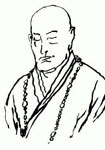
齐己(863年—937年)出家前俗名胡德生,晚年自号衡岳沙门,湖南长沙宁乡县祖塔乡人,唐朝晚期著名诗僧。 齐己的古诗词
诗词《寄答武陵幕中何支使二首》的中文译文如下:
十万雄军幕,
Three hundred eminent guests.
何当谈笑外,
When can we talk and laugh freely,
远慰寂寥来。
To bring comfort to the loneliness?
骚雅锵金掷,
Elegant and refined, the sound of gold and jade.
风流醉玉颓。
Charming and debauched, drunk and decadent.
争知江雪寺,
Who would know the snow-covered temple by the river,
老病向寒灰。
Facing old age and illness in the cold ashes.
南州无百战,
In the southern region, there is no great battle,
北地有长征。
In the north, there is the Long March.
闲杀何从事,
What can one do in one's idle killing?
伤哉苏子卿。
Oh, how it hurts, Su Ziqing.
江楼联雪句,
The snow-covered sentences of the river tower,
野寺看春耕。
The wild temple watches the spring plowing.
门外沧浪水,
Outside the gate, the Canglang River.
风波杂雨声。
The wind and waves mixed with the sound of rain.
这首诗词中,齐己以丰富的比喻意象,写出了朝廷中的荣耀和繁华,以及个人的孤独和无奈。诗中通过描绘十万雄军、三千上客才等来显示幕中的繁荣;表达了对外界幸福生活的向往,同时也批判了朝廷内部的虚伪和权谋。诗中还以韵律婉转的语言描绘了江雪寺、南州、北地等地景,表现了诗人对自然的向往和思考。
整体而言,这首诗词揭示了作者对社会现实的思考和不满,同时展示了他对自然和宁静生活的向往,以及对人生追求和意义的思考。它运用鲜明的形象和对比来展示人生的荣耀和苦难,给读者留下了深刻的印象和启示。
jì dá wǔ líng mù zhōng hé zhī shǐ èr shǒu
寄答武陵幕中何支使二首
shí wàn xióng jūn mù, sān qiān shàng kè cái.
十万雄军幕,三千上客才。
hé dāng tán xiào wài, yuǎn wèi jì liáo lái.
何当谈笑外,远慰寂寥来。
sāo yǎ qiāng jīn zhì, fēng liú zuì yù tuí.
骚雅锵金掷,风流醉玉颓。
zhēng zhī jiāng xuě sì, lǎo bìng xiàng hán huī.
争知江雪寺,老病向寒灰。
nán zhōu wú bǎi zhàn, běi dì yǒu cháng zhēng.
南州无百战,北地有长征。
xián shā hé cóng shì, shāng zāi sū zǐ qīng.
闲杀何从事,伤哉苏子卿。
jiāng lóu lián xuě jù, yě sì kàn chūn gēng.
江楼联雪句,野寺看春耕。
mén wài cāng láng shuǐ, fēng bō zá yǔ shēng.
门外沧浪水,风波杂雨声。